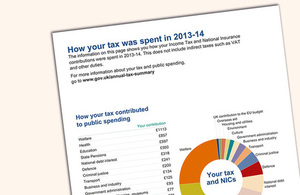Personal tax summaries: seven things to know
People across the UK will begin receiving their first personal tax summary from Monday 3 November. Find out what they’re all about.

Tax summary example
1. Personal tax summaries show you how your tax is calculated and what it is spent on
Personal tax summaries show you how much income tax and national insurance contributions (NICs) you paid over the financial year 2013 to 2014, and how this is calculated.
The back of the summaries show you how your tax contributed to public spending, for example, how much of the tax you paid went on health, defence, overseas aid and more.
They also show you your ‘tax-free’ amount. This is how much money you earn which isn’t taxed at all (the government doesn’t tax the first £9,440 you earn each year).
Access examples of the tax summaries on HM Treasury’s flickr page.
2. Overall, 24 million people will receive a personal tax summary
This is the first year that the government is sending out personal tax summaries, and from now on, you’ll continue to get one each year.
There are around 30 million personal taxpayers in the UK, so around 80% of individual taxpayers will receive a personal tax summary.
People won’t receive a personal tax summary if they have paid no income tax in the past year or where we are waiting for information - for example a change of address, or updated PAYE information from their employer.
3. You don’t have to do anything with them
The personal tax summary is for your reference only – you don’t have to do anything with it.
The government is sending them out to improve the transparency of the personal tax system, so that you know how much tax you pay, how it is calculated, and how the government spends it.
It also means that you can make us, the government, more accountable for the tax that you pay and the way that it is spent.
4. It’s all part of a wider aim of the government to make the tax system fair and simpler
HMRC’s self assessment customers can already access their Tax Summary through HMRC Online Services. These online summaries will are available to self assessment customers from the 3rd November providing they have filed their tax return for the previous year.
Customers who file after the 3rd of November will be informed of the online tax summary when they submit their tax return.
In future, HMRC will provide everyone with a digital account which will include their tax summary.
Watch the video demo of the online personal tax summaries – no sound
5. Not everybody will get theirs on the same day
Personal tax summaries will be sent in batches over several week, as there are a large number going out in total. The first tax summaries will hit doormats on 3 November, and most will have been sent by mid-December.
6. The personal tax statements are all sent confidentially
We don’t include any sensitive information, such as your national insurance number, on the personal tax summaries to protect taxpayers’ information.
HMRC will never ask you for your personal details.
7. Existing figures on public spending have been used to calculate the summary of how people’s tax is spent
The amount that the summaries show how much is spent and on what are existing figures that the Treasury produces. These are known as the public spending statistical analysis figures (PESA).
Find out more about how public spending was calculated in your tax summary.